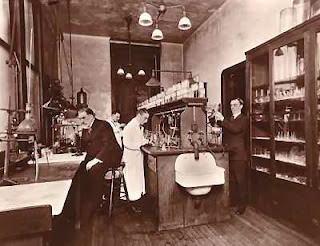Yesterday there was a leak in the library ceiling.
As I was not in working and the leak was next to my desk, it went unnoticed until it started dripping down on our collection of Bibles. Kathy heard it and went to investigate, finding several of our Bibles wet already. Thanks goodness for the Librarian's innate alertness to extraneous noise.
In our collection we have a seventeen volume, large format, braille Bible. It is quite beautiful. Since each of the books in quite large, it only fits on the top shelf of the unit containing the Bibles.
Do you see where this is going?
Three of the seventeen volumes were wet, along with two or three other Bibles of a less unique nature. They were still damp when I arrived at the library this morning, and I can't help being concerned about them. For one thing, it seems fairly obvious that an alphabet that relies on embossing is more susceptible to water damage than other books. For another, braille requires a thickness of paper that doesn't dry out quickly as opposed to the hair-thin paper used in a conventional Bible. It absorbs more water and remains wet longer which leads to a bibliophiles worst nightmare: mold.
While I might be exaggerating somewhat in regards to the "worst nightmare" status of mold, it is still no laughing matter. Books hold moisture very well, are made of natural materials, and are often left undisturbed on the shelf for an extended period of time. This makes them a prime target for mold, and it travels. A whole stack can be at risk if one book starts growing.
Next to my desk are two shelf units, one holds our Bibles, and the other holds a large collection of hymnals and other music books. Many of these would be easy to replace. Some: not so much. I have three Welsh Bibles from the 1800s, I have a Bible in a Scandinavian dialect that Google and Wikipedia were unsure about, I have a gorgeous Icelandic Bible from the early 1900s, I have some very old,. very fragile hymnals, I have a tiny leather bound Bible that fits in the palm of my hand. Needless to say, losing any of these to mold or water would be awful.
Here's the thing about water damage: it seeps in slowly and is sometimes hard to detect. How long had the pipes in my ceiling been leaking before it saturated the panel above the bookshelf? How long was that absorbing water before it started dripping? How long was it dripping before Kathy heard it and found the leak? How long were the books soaking up water? How long will it take them to dry out? There wasn't a cascade of falling water, there wasn't even a huge amount of damage done. The sneakiness of it is the worst.
Here's where we turn books and water and mold into a metaphor.
How often does one little thing slide, one small habit get started, or one tiny incident get overlooked that can build and grow and become ingrained and "suddenly" become a huge issue? Maybe communication between friends or family is suffering, maybe someone's health is quickly degrading, maybe a company's practices have become increasingly worrying, maybe there are car troubles, or a churning rumor mill, or deep-set prejudices, or plumbing that leaks. When and where did the trouble even get its start?
I recently discovered that the Calgary Public Library includes audiobooks in their electronic collection, and that I can download and listen to these on my phone (technology!). My most recent "read" is The Tipping Point, by Malcolm Gladwell. A fascinating read at any time, it seemed especially so today. Positing that large and widespread changes in behavior, whether it be crime rates or shoe sales or the results of Paul Revere's Midnight Ride, are very often the results of tiny incidents/qualities/actions, Gladwell makes a convincing argument for the power of tiny tweaks. Small things result in wide ripples.

A slow leak from a plastic joint in a pipe above a bookshelf is a small thing with large consequences, as are hasty words said in anger, or minor dishonesty in a company, or even things like giving up a gym pass or allowing sloth to creep into your morning or picking up a nigh-on harmless habit. One day you realize that instead of just patching a little leak, you have to empty a book shelf and sort through which books are wet and which are dry and make sure the wet ones aren't put back on the shelf until every trace of water is gone. Let it go a little further and instead of just patching a leak and drying things out, you have a stack of books full of mold and made unsalvageable.
So what's the solution? If we had caught the leak earlier I wouldn't be faced with three damaged volumes in my braille set. Better yet, if the pipe had been done with soldered copper instead of chancy plastic in the first place, the likelihood of leaks would have been far lower.
It is important to be aware of the eventual ramifications of our actions. This is especially true when it comes to how we speak to and about each other. James compares the tongue to the rudder of a ship, the bit in a horse's bridle, or to the spark that starts a forest fire. If I listed all the Proverbs that talk about the importance of guarding and monitoring our speech, we would be here all day. Jesus said that "out of the overflow of the heart the mouth speaks". As we know a tree by its fruit, so we know a person by what they say and do. A leak of negative words can start out small but can result in a significant amount of clean up, and affects not only the people around us, but ourselves as well.









.JPG)












